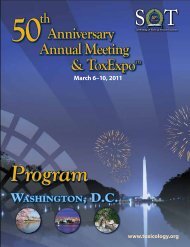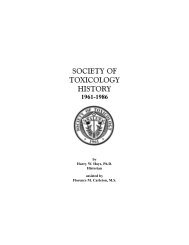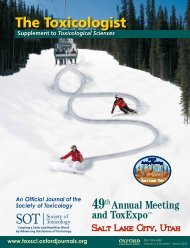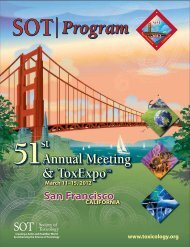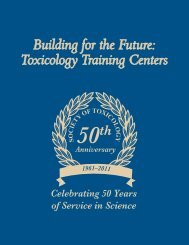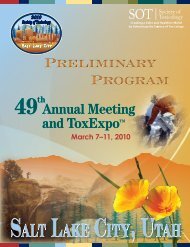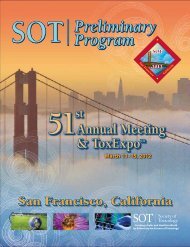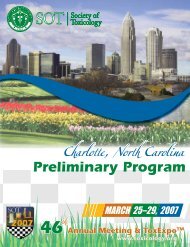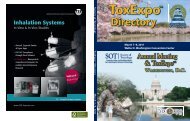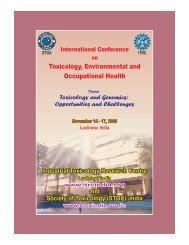Program - Society of Toxicology
Program - Society of Toxicology
Program - Society of Toxicology
Create successful ePaper yourself
Turn your PDF publications into a flip-book with our unique Google optimized e-Paper software.
44 th Annual Meeting<br />
and ToxExpo<br />
<strong>Program</strong> Description<br />
Tuesday Afternoon, March 8<br />
12:00 NOON to 1:00 PM<br />
La Louisiane Ballroom B<br />
SOT/EUROTOX DEBATE<br />
Motion: Nanoparticles are a Major Threat to Human Health<br />
Sponsored by:<br />
SOT (<strong>Society</strong> <strong>of</strong> <strong>Toxicology</strong>)<br />
EUROTOX (European Societies <strong>of</strong> <strong>Toxicology</strong>)<br />
Debaters:<br />
(Pro) SOT: Joseph V. Rodricks, Ph.D., DABT, The ENVIRON<br />
Institute for Health Risk Sciences, Arlington, VA<br />
(Con) EUROTOX: Anthony Seaton, Pr<strong>of</strong> Emeritus, University <strong>of</strong><br />
Aberdeen, Scotland.<br />
Nanoparticles represent an explosively expanding technology for selective drug<br />
delivery. The number <strong>of</strong> potential applications is limitless; However the highly<br />
penetrant properties raises serious concern regarding wide-spread, uncontrolled<br />
distribution and possible persistence <strong>of</strong> these particles within living systems.<br />
The discussants will produce strong and persuasive arguments both in support<br />
and to refute adverse human health concerns <strong>of</strong> this rapidly emerging technology.<br />
Tuesday Afternoon, March 8<br />
12:15 PM to 1:15 PM<br />
Room 223<br />
INFORMATIONAL SESSION: RAPID GENERATION OF<br />
PREDICTIVE TOXICOGENOMIC ANALYSIS — PRESENTED BY<br />
GENE LOGIC<br />
Learn how to facilitate drug candidate selection by characterizing a compound's<br />
toxicity pr<strong>of</strong>ile using an easy, intuitive toxicogenomic-based s<strong>of</strong>tware application.<br />
Several case studies will be discussed that demonstrate how these rapidly<br />
generated results can be combined with other data to help make better inform<br />
compound decisions.<br />
Tuesday Afternoon, March 8<br />
1:30 PM to 2:30 PM<br />
Room 215<br />
INFORMATIONAL SESSION: LEVERAGING A MULTI-<br />
DIMENSIONAL CARDIOVASCULAR ASSESSMENT DURING LEAD<br />
OPTIMIZATION — PRESENTED BY CORDYNAMICS<br />
CorDynamics is a contract research organization focused on examining the<br />
cardiac effects <strong>of</strong> emerging drug candidates. Our models allow us to optimize<br />
these lead candidates early in the drug development process. Focusing on this<br />
critical and dynamic phase improves the attrition rates <strong>of</strong> compounds selected<br />
for further testing, thereby reducing the overall costs and timelines associated<br />
with your projects.<br />
Tuesday Afternoon, March 8<br />
1:30 PM to 3:30 PM<br />
Room RO2<br />
FORUM ON GRANTSMANSHIP AND SOURCES FOR RESEARCH<br />
SUPPORT<br />
Chairperson(s): Mitzi Nagarkatti, Virginia Commonwealth University,<br />
Richmond, VA and Rosita R. Proteau, Oregon State University, Corvallis, OR.<br />
Sponsored by:<br />
Career Resource and Development Committee (formerly the Placement<br />
Committee)<br />
Education Committee<br />
The Grantsmanship Forum will provide an overview <strong>of</strong> a variety <strong>of</strong> research<br />
funding sources and tips for successful applications for scientists at all stages <strong>of</strong><br />
their research careers.<br />
The first two talks will address NIH funding, including the reorganization <strong>of</strong> the<br />
review process by the Center for Scientific Research (CSR), which reviews the<br />
majority <strong>of</strong> applications to NIH. For the toxicology community, this restructuring<br />
has meant the elimination <strong>of</strong> two <strong>of</strong> the study sections in which many<br />
toxicology grant applications were reviewed. A third study section, used for<br />
neurotoxicology applications, was replaced. There has been confusion among<br />
applicants about the appropriate study section for their applications, as well as<br />
concern about toxicology applications getting proper reviews. The first speaker<br />
will provide a brief overview <strong>of</strong> the restructuring process, some results<br />
regarding toxicology applications from the first several review cycles, and some<br />
thoughts for applicants on how to work within the new system and hopefully be<br />
more successful.<br />
The second presentation will provide an overview <strong>of</strong> some <strong>of</strong> the specialized<br />
NIH grant mechanisms available to support research, training and career development.<br />
Included will be information on Career Development Awards (K series<br />
grants), Fellowships (F series grants), Training (T series grants), and research<br />
grants designed for specialized goals (R series grants).<br />
The EPA is another significant funding source for toxicologists. The third<br />
speaker will discuss EPA’S extramural grants and fellowship program with<br />
particular emphasis on Science to Achieve Results (STAR) <strong>Program</strong>. The EPA<br />
issues requests for applications in targeted areas that complement EPA’s intramural<br />
research programs. First, applications undergo a scientific review by an<br />
external peer panel, and then an internal programmatic review. These grants lead<br />
to interactions between extramural and intramural scientists. In addition, EPA<br />
supports graduate students in environmental science and engineering through<br />
the STAR program.<br />
Significant opportunities for research funding beyond NIH and EPA are also<br />
available. An experienced SOT investigator will provide perspectives on finding<br />
these sources. Learn ways to identify these alternative funding sources and their<br />
missions. Each funding source has a set <strong>of</strong> goals that need careful consideration<br />
as you apply for dollars to support your research effort.<br />
Time will be available for specific questions to these speakers.<br />
1:30 PM Introduction, Mitzi Nagarkatti, Virginia<br />
Commonwealth University, Richmond, VA.<br />
1:35 PM Reorganization <strong>of</strong> NIH Study Sections, Patrick<br />
Mastin, NIEHS, Research Triangle Park, NC.<br />
2:10 PM Non-Conventional Sources <strong>of</strong> NIH Funding, Carol<br />
Shreffler, NIEHS, Research Triangle Park, NC.<br />
2:45 PM Funding from Environmental Protection Agency,<br />
Elaine Z. Francis, U.S. EPA, Washington, DC.<br />
TUESDAY<br />
up-to-date information at www.toxicology.org 125



